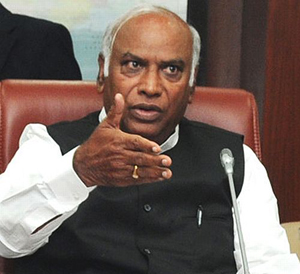New Delhi, Nov 27: The speech by the leader of the Congress in the Lok Sabha, Mallikarjuna Kharge, during a special debate on Thursday met a strong protest from Parliamentary Affairs Minister Venkaiah Naidu.
It resulted in Speaker Sumitra Mahajan expunging some of his remarks from the record.
Speaking in the debate on the Commitment to the Constitution, Kharge warned of serious consequences if any attempt was made to tinker with the Constitution, drawing a sharp reaction from the government which said the opposition should not issue any threats.
“If someone tries to review the Constitution, there could be... (grave consequences)," Kharge said, while contending that such attempts earlier have met with failure.
BJP members including Naidu protested against his remarks and demanded them to be expunged on objectionable grounds.
Speaker Sumitra Mahajan said she would expunge the objectionable words. Kharge, who spoke for over an hour, also rejected the criticism that nothing was done in the last 65 years saying several projects were initiated by Jawaharlal Nehru towards building a modern India.
It was only because of the initiatives taken by the Congress government that it had become possible for the Centre to implement laws like Right to Food Act and Right to Education, he said. He also suggested that instead of a mere discussion, the government should take steps to implement the ideas of Ambedkar for the uplift of the poor and deprived sections of the society.
He also urged the government to ensure that persons from deprived sections also get place in key government position, including in the judiciary. He also requested the government to check growing atrocities against the Dalits and punish the guilty.
Rajnath Singh criticised
The Congress leader said it was not correct on the part of Union Home Minister Rajnath Singh to object to introduction of words like ‘Socialist’ and ‘Secular’ in the Preamble to the Constitution.





Comments
Add new comment